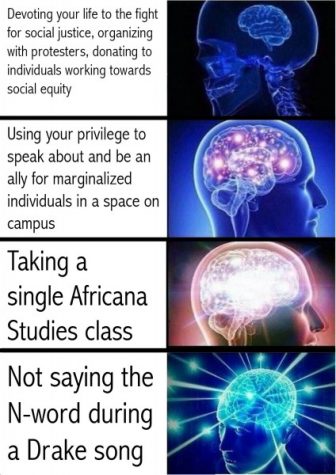FULLABALOO: White Tulane student chooses not to sing N-word in Drake song, ends racism
March 27, 2019
 On March 22, 2019, at a “Call of Booty” party in the Theta Kappa Ligma house, the entire course of history changed. For on this day, thus known as the Day We Were Freed From Our Chains, racism was ended with one Tulane student’s single audacious action — all to the tune of Drake’s 2011 hit, “The Motto.”
On March 22, 2019, at a “Call of Booty” party in the Theta Kappa Ligma house, the entire course of history changed. For on this day, thus known as the Day We Were Freed From Our Chains, racism was ended with one Tulane student’s single audacious action — all to the tune of Drake’s 2011 hit, “The Motto.”
“It was just any other Friday night,” Theta Kappa Ligma brother Connor Sherman said. “We hadn’t thrown a real banger in a while — well, we threw one last week, but people said it didn’t go hard enough, so this time we had to show people that Ligma really is a top-tier frat on campus. I’m taking this marketing class right now — shout out to Adderall for getting through that one — and we’re learning about how to make your product attractive to potential buyers. In this case, my product is the social health of Ligma, and I realized music was the way to do it.”
According to Sherman, potential Theta Kappa Ligma brothers, also known as pledges, are usually forced to make party playlists with the threat of violence if their selected music does not “get everyone super hype.” But on this night, Sherman’s intuition told him it was time to take a break from routine.
“It was like something inside me was like, ‘Just send it bro. You just gotta do it. The future of everything is in the balance.’ By future, I was only really thinking about my social life for the next two years if our party wasn’t a major dub. But now I know differently,” Sherman said. “So I decided to make that night’s party playlist myself.”
That night, Sherman’s playlist made its debut at Theta Kappa Ligma’s annual “Call of Booty” party, a celebratory theme they had repeated multiple times throughout the 2018-19 school year despite its claim of being an yearly affair. It was then that history was made.
Julia Calhoun, a partygoer, told us she can still visualize the moment to this day.
“I was standing on the table having my friend take a picture of me when it happened. They turned on some Drake song, like a really old one, and I remember me and her looked at each other like, ‘this is the perfect throwback jam.’ I was actually thinking of so many potential Instagram captions that minute, but I forgot all of them when it happened.”
According to Sherman, “It was only like 11:30, but everyone was already dumb lit, so me and the boys already knew the night was gonna be a success. And then ‘The Motto’ by Drake came on. I got this feeling, like it was time to do something big — something I’d never done before. I heard that voice in my head like, ‘Just send it bro.’”
It was at this moment that Black and brown people’s centuries-long struggle against institutional barriers, prejudiced mindsets and literal violence reached its climax. Racism, in all its forms, was confronted with the bravery of one young shirtless Tulanian.
As “The Motto”’s chorus hit, Sherman said, “I looked my boys in the eyes and didn’t say the N-word.”
Sam Simmons, a member of sorority Theta Alpha Phi, remembers Sherman’s valiant act vividly.
“Usually at frat parties, they play rap music … I know it’s wrong, but it kind of kills the vibe when you have to like, go silent in the middle of a song,” Simmons said. “Not to speak for all white people, but for me and my friends, when everyone is singing along [to a rap song], we just kind of say the N-word sometimes. Connor always did too. Until he did what all of us never had the strength to do.”
Directly following Sherman’s monumental decision, every party patron’s cell phone, as well as every cell phone in the nation, received a text from President Donald Trump alerting the nation that racism was officially over. A flurry of Apple News notifications shortly ensued, with headlines such as “The 20 stages of emotion you went through went racism ended” from Buzzfeed News and a New York Times op-ed entitled “The White Savior Complex– was it valid all along?”
“It was totally insane. Everyone was holding up their phones like, ‘You’re the man!’” Sherman said. “I usually remember nothing from Ligma parties, but I’ll remember this until the end of time.”
And so will the rest of the civilization.
Tulane especially wasted no time cementing Sherman’s legacy. The university released a statement hours later announcing that as a result of his contribution to history, F. Edward Hebert Hall, whose namesake has been contested by students for years on account of his racist beliefs, would be renamed after Sherman. During a press conference on this decision, President Fitts said, “We’ve heard your voices loud and clear, and from this day forward, Hebert Hall will be no longer. Who better to rename it after than the truly audacious Tulane student who ended racism, a state-sanctioned belief system that Mr. Hebert held so dear?”
Sherman says he is still dealing with the aftermath of this life-altering event.
“I was honestly just trying to lead by example,” Sherman said. “I never knew I would become an example for generations to come.”









Briley Richmond • Jun 18, 2020 at 3:42 am
Tulane is scheduled to play Miss State in Starkville. The Mississippi state flag contains the confederate flag in it. Tulane has many skeletons of racism in its past. It seems that by sending our team to Mississippi while that flag is flying in Mississippi we are endorsing the racism. I fear the value of our diplomas will be destroyed if we enforse Mississippi’s racism like this. We have too much slave and too much racist history to get this close to that flag. Would your paper address this issue? Briley Richmond. My diploma is from the law school. 1975